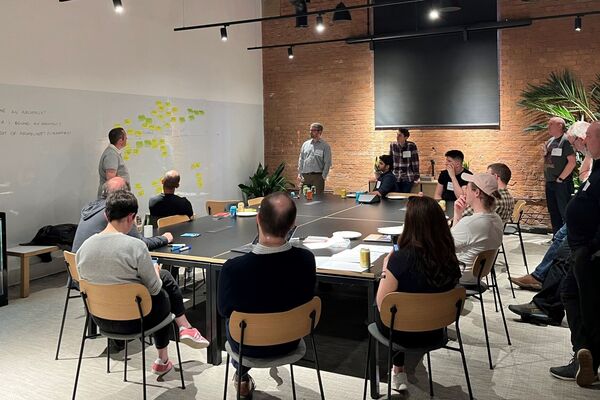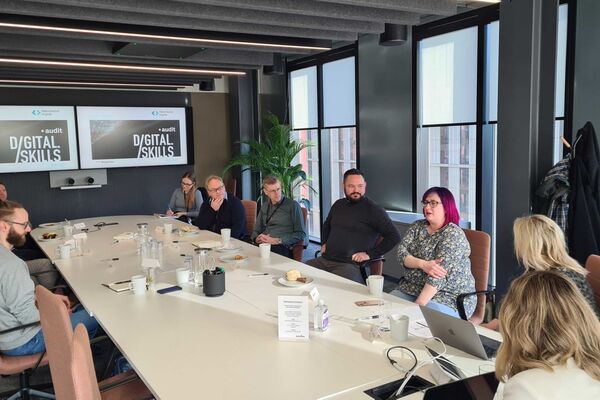Manchester Leaders in Tech Roundtable – July 2022
Pubished 26th July 2022
This article was originally published on the Infinity Works website.
Focused on the future of leadership in tech, this roundtable event brought together leaders to discuss our industry’s hot topics. More widely attended than our previous event in April, this time we brought a host of new people into the conversation. Around 20 tech leaders joined us at the Bonded Warehouse – one of Manchester’s oldest warehouses, now one of its slickest enterprise hubs.
A relaxed approach to an engaging discussion
In a departure from our usual roundtable approach, we went with a more relaxed, social style at this summer event. Our guests were a mixed group, comprising new faces and long-standing attendees alike – representing household brands such as the BBC and Disney, and local innovators such as Kalibrate and the Modern Milkman.
Many people had crossed paths before – which is no surprise with Manchester’s tech scene being very well established. We began the session by holding a vote on topics for the main discussion – as well as inviting new suggestions. We split the group into small subsets, making it easier for everyone to add to the conversations. And it worked. The discussions were varied and fruitful – sometimes providing answers, sometimes raising questions – while keeping up the dynamic momentum our roundtable events are known for.
Exploring Manchester’s tech community
No one can deny the influence of Manchester’s tech industry – but what’s the scene like today? Some guests were keen to point out how much the community had evolved – both in terms of the type of tech being created and ways of working. Over the years Manchester has opened its doors to the likes of the BBC, Booking.com, and AO – seeing wave after wave of tech talent forge careers in the city. Still, many guests were reluctant to pin a catch-all definition of “the Manchester tech community”. They cited the sheer diversity of players in the sector – from start-ups to big brands, corporates to collectives, and so many different events.
The rise of remote working has seen vacancies continue to be filled at a startling rate – although increasingly for positions at national and global companies which have no physical Manchester base. As a result, there are many Manchester tech workers who have no physical connection with the city’s businesses.
Many attendees agreed that Manchester’s reputation on the national scene means it hasn’t lost its appeal to fresh new talent and business. A wealth of connections, good transport, and vibrant urban life, continue to draw in players at all levels.
Some suggested the existence of a renewed North-South divide in tech industry politics. With the recent train strikes and the rise in travel costs, many workers are put off regular commutes to and within London – enabling Manchester to become a viable option for workers who might have otherwise been attracted to the idea of working in the capital. While the wider industry may remain London-centric for now, the north is growing in appeal and successfully forming a tech hub of its own.
In the current climate, industry events tend to be led by corporations – with less “grassroots” activity there once was. However, these changing dynamics often provide opportunities for all parties in the jobs market.
Talent and training in the age of hybrid working
The next discussion addressed remote working directly – highlighting the issues facing people in leadership roles who want to work from home permanently, as well as remote workers at the start of their careers. What might this mean for onboarding new talent, and how can we improve community-building efforts within organisations in a way that reduces talent attrition?
This topic touched on the culture of introversion in tech. The feeling was that companies see that a majority of tech workers are generally happy to work from home and at times unwilling to return to the office, relative to other industries. Many participants felt that this pressure to go “back to work” had led to higher staff turnover, with flexibility and trust among the major new factors creating a healthy working environment for employees at all levels.
That said, the need for companies to make cultural and operational changes to adapt appropriately to this shift, is real and pressing. Leaders who have built their careers exclusively in an office environment are struggling to adjust to the remote or semi-remote working patterns now expected by new hires. This brings the subject of leadership to the fore – today’s strong leaders must embrace an evolving work environment and actively seek the input of their teams, for the purposes of formal training and cultural assimilation.
Some mentioned feeling that interactions are transactional when working from home, which lacks the social nuances of in-person, in-office conversation. Others were of the opinion that anyone can learn tech, but to gain the personable ‘soft skills’ required to succeed in the corporate arena, social contact is essential.
Conversation with colleagues outside of formal meetings is an important learning point for every employee. It’s an opportunity for new hires to witness the everyday working wisdom of their leaders, ingrain themselves in company culture, and develop a sense of long-term belonging. However, it was pointed out that with video calls now the norm, you can still feel ‘remote’ from other team members even if you’re working side-by-side in the office.
Regardless of the decisions employers and employees make regarding remote working, the tech industry is inherently social. It’s a sector that develops and grows through discussions like our roundtables. Therefore, a big challenge is how to share learnings with everyone – whether they are attending in person or not.
Community and culture are harder to establish and maintain online – especially when you consider the need for safeguarding and active participation.
For example, while a ‘cameras always on’ policy may work for some, it may not for others. The important thing is to approach cultural decisions on a team-by-team basis, taking on board the opinions of employees at every level.
With evolving boundaries and expectations of professionalism, flexibility is key. Ongoing listening, compromise, and learning at a leadership level were all hailed as key to approaching these challenges.
Culture is the future of tech
Salaries in tech are on the rise. With so many jobs available, candidates have greater power to choose a company whose values and culture is most appealing.
Venture Capital has provided big investment bursts for start-ups, allowing them to offer high-paying salaries to new hires in recent years. Add to this the tech boom that happened over the pandemic – when blanket remote working gave start-ups access to a wider labour pool – and the result is warped expectations of salaries in the industry.
Disproportionate salaries can exacerbate the talent gap – overpaying lower-level hires and warping their salary expectations in the long run, as well as discouraging them from upskilling.
Our roundtable guests cited an element of risk that follows the rewards of joining a start-up. While start-ups can offer big salaries, they lack the promise of reliable long-term income and stable culture.
At this point in the discussion, we asked the question: is there an end in sight or a potential bubble bursting in terms of salary inflation? Many guests responded that the more opportunities out there, the greater the level of attrition. There is always the offer of a bigger salary elsewhere for employees who get cold feet at their current company. These days, four years is considered a very long time to stay with the same business.
A strong company culture can help counteract attrition. After all, salary is only one factor which persuades employees to stay or leave. Soon salaries will stabilise, with culture taking on a new significance in pulling in and keeping talent.
Unlike start-ups, long-established companies can offer long-term stability to their employees – both in terms of their position in the wider industry, and their culture.
It’s clear that the current dilution of culture is creating a buoyant job market in tech. In the future, culture will be key in creating a point of difference between companies. As salaries rise, people looking to make a career in this industry will be looking to also build strong relationships within their company and community.
Leadership starts at the grassroots
While there is still high demand for talent in the tech industry, there’s also the need to make roles more widely understood to avoid a decline in uptake in the future.
Leaders could play a more active role in delivering awareness of tech and its many opportunities at a grassroots level to bring about a mindset change. Direct involvement has the potential to encourage tech career routes from early on – increasing accessibility and closing the skills gap.
Key takeaways
The central takeaway of our Manchester summer tech roundtable was that people are more central to tech than ever.
While tech skills can be acquired and transferred with ease to those ready and willing to learn – regardless of working patterns – the social side of working in tech is facing new challenges.
Culture and engagement are areas that tech leaders should be turning their attention to tackle the talent problem and bring down staff turnover. Events like leadership roundtables are essential for sharing concerns and identifying industry-wide patterns. However, to really get to grips with these issues, leaders should engage with their teams.
The tech industry and its leaders must continue to take care of their people and nurture their growth in whatever form that may take. A dynamic, human-centric approach is fast becoming the only way forward.

